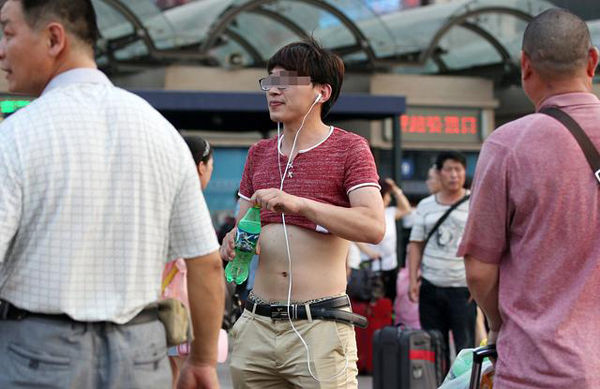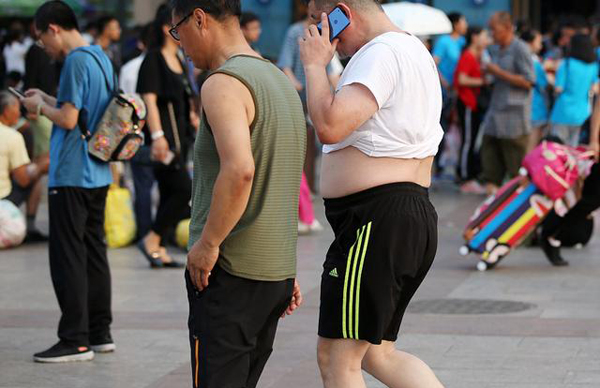當(dāng)前位置: Language Tips> 新聞播報(bào)
分享到
北京的夏天悶熱得像被一條無盡的濕紗布包裹著。可悲的是,這座有幸擁有地球上最時(shí)尚靚麗女性的偉大城市,也是一群呆笨男人的容身之地。這些人認(rèn)為消暑的最好方法是把褲腿卷至膝蓋,把襯衫撩至啤酒肚上方。而現(xiàn)在,這樣的人越來越多。
By Murray Greig
Disclaimer: The writer is a socially awkward and emotionally stunted Canadian whose high school graduation class voted him “most likely to be found dead in a cheap hotel room.” Since he is barely capable of dressing himself, any inference of sartorial acumen in the following commentary should be taken under advisement.
免責(zé)聲明:本文作者是一個(gè)不擅社交,情商又低的加拿大人。他曾在高中三年級(jí)時(shí)被同學(xué)票選為“最有可能被發(fā)現(xiàn)死在廉價(jià)旅社的人”。因?yàn)樗麕缀醪粫?huì)打扮自己,因此,下文中任何涉及著裝技巧的言論都請(qǐng)慎重采納。
As summer's swelter envelops Beijing like an endless strip of sweat-soaked gauze, it's painfully apparent that this great city, blessed with some of the most beautiful and stylish women on the planet, is also home to an expanding legion of dorky men who believe the ideal way to beat the heat is to roll up their trousers to knee level and hike their shirts above their beer bellies.
北京的夏天悶熱得像被一條無盡的濕紗布包裹著。可悲的是,這座有幸擁有地球上最時(shí)尚靚麗女性的偉大城市,也是一群呆笨男人的容身之地。這些人認(rèn)為消暑的最好方法是把褲腿卷至膝蓋,把襯衫撩至啤酒肚上方。而現(xiàn)在,這樣的人越來越多。

Sad, but true.
雖然令人不悅,但這就是事實(shí)。
Let's state the obvious: Any man who feels compelled to advertise his love of pijiu by transforming a shirt and pants into the ubiquitous 'Beijing bikini' should be embarrassed. What is the thought process here, guys? Are you simply too cheap to spring for normal hot-weather attire, or are you genuinely convinced that 'slovenly' equates to 'cool'?
說得再明白點(diǎn):任何一個(gè)把襯衫和褲子穿成了現(xiàn)在隨處可見的“北京比基尼”的男人,都應(yīng)該對(duì)他這種“示愛”啤酒的行為感到難為情。先生,請(qǐng)問您到底是怎么想的?難道您真的吝嗇到連正常的夏裝都不買的程度了嗎,還是您的確認(rèn)為“不修邊幅”就等于“酷”?
As a fellow fashion-challenged misfit with a decades-long reputation for inappropriate dress, I can see how rolled-up trousers and half a shirt might be a comfortable combination while stumbling home after a night of barroom debauchery – but definitely not on a bustling sidewalk in the middle of the afternoon … and especially not in mixed company.
作為一個(gè)有著幾十年衣著不當(dāng)?shù)拿暎瑯优c當(dāng)下時(shí)尚格格不入的人,我能明白在酒吧放縱一夜后搖搖晃晃地回家的時(shí)候,褲子和襯衫半卷著的搭配有多么舒服。但這身打扮絕對(duì)不應(yīng)出現(xiàn)在下午時(shí)分繁忙的人行道上……尤其不應(yīng)該出現(xiàn)在有異性的場合中。
That goes double for taxi drivers.
對(duì)于出租車司機(jī),更應(yīng)嚴(yán)加禁止。
On a recent scorching Saturday at Lido Park, a friend and I counted 13 BB-clad guys. Most were flying solo, but the few sorry saps accompanied by female companions were totally oblivious to their lady's unmistakable reticence to engage in close contact. In every instance, the wife or girlfriend was smartly dressed, which only served to spotlight a visual dichotomy almost as wretch-inducing as the emasculated puppy dogs that dutifully tote their woman's purse or the cooing couples who insist on wearing matching outfits.
在最近一個(gè)炎熱的周六,我和一個(gè)朋友在麗都公園共發(fā)現(xiàn)了13個(gè)穿“北京比基尼”的伙計(jì)。這些人大多獨(dú)自成行,但有少數(shù)幾位糟糕的傻瓜是與女伴同行。這些人完全不知道他們的女伴很明顯不愿與其親密接觸。他們每個(gè)人的妻子或女友都穿著時(shí)尚,這只會(huì)讓人感受到強(qiáng)烈的視覺對(duì)比。一邊的男人就像被去勢的小狗一樣窩囊,盡職盡責(zé)地提著他們女人的包,一邊是堅(jiān)持穿情侶裝的如膠似漆的情侶。

Not that I'm without empathy. As holder of China Daily's unofficial title of 'worst dressed foreigner' for four straight years, woeful wardrobe choices have become something of a personal trademark. My favorite color combo is black with camouflage, and I figure a sleeveless T-shirt (preferably adorned with a politically incorrect slogan or image), track pants and a Yankees baseball cap are perfectly acceptable as formal wear. But I have a perfectly plausible excuse: I'm old and beyond hope. And unlike proponents of the 'Bejing bikini,' I have no delusions about my image in the mirror – or in the eyes of passers-by.
并不是說我沒有同情心。作為《中國日?qǐng)?bào)》“穿著最糟外國人”非官方稱號(hào)連續(xù)四年的得主,糟糕的著裝選擇已經(jīng)成為了我的個(gè)人標(biāo)志。我最喜歡的顏色搭配是黑色加迷彩。我也認(rèn)為無袖T恤(最好是帶有政治不正確的口號(hào)或圖片)、運(yùn)動(dòng)褲和洋基棒球帽在正式場合是完全可以接受的。但我有一個(gè)合情合理的理由: 因?yàn)槲乙呀?jīng)老了,也沒什么希望了。不像“北京比基尼”的支持者,我對(duì)自己在鏡子里或者路人眼里的形象沒有錯(cuò)誤幻想。
So take it from one of your own; it's a simple question of optics. There's a subtle difference between dressing casually and dressing like you're auditioning for a guest shot on Homeless but Happy.
所以,看看你自己身上有沒有這樣的問題;這其實(shí)是一個(gè)簡單的視覺問題。穿得隨意和穿得像是去試鏡《快樂的流浪漢》是有微妙差別的。
But hey, don't take my word for it. Just ask all those pretty ladies that are keeping their distance.
但是,別信我的話。還是去問問那些與之保持距離的漂亮女士們吧。
英文來源:“CHINA DAILY”微信公眾號(hào)
翻譯:曲金瑤
編審:丹妮 董靜
音頻編輯:焦?jié)?/p>
更多內(nèi)容請(qǐng)關(guān)注“CHINA DAILY”微信公眾號(hào):


Murray Greig is a Canadian author and sports journalist who has resided in China for 6 years. He enjoys watching sports and old movies with his two cats, who were rescued off the streets of Beijing.
上一篇 : 老外在中國:交通安全至上
下一篇 :
分享到
關(guān)注和訂閱

關(guān)于我們 | 聯(lián)系方式 | 招聘信息
電話:8610-84883645
傳真:8610-84883500
Email: languagetips@chinadaily.com.cn